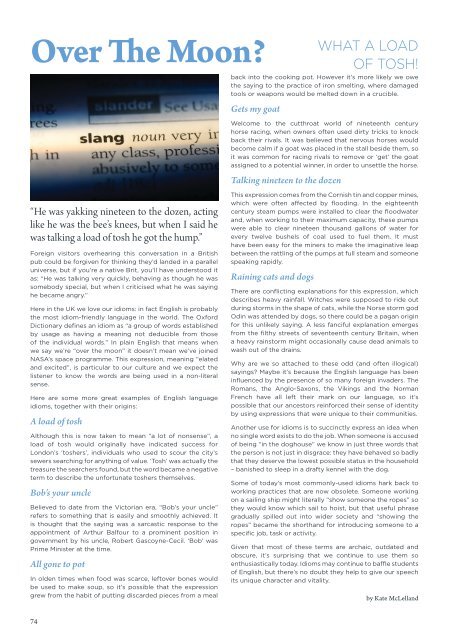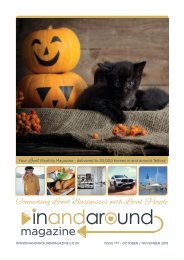I and A Mag Sep19
Telford Magazine
Telford Magazine
You also want an ePaper? Increase the reach of your titles
YUMPU automatically turns print PDFs into web optimized ePapers that Google loves.
Over The Moon?<br />
back into the cooking pot. However it’s more likely we owe<br />
the saying to the practice of iron smelting, where damaged<br />
tools or weapons would be melted down in a crucible.<br />
Gets my goat<br />
Welcome to the cutthroat world of nineteenth century<br />
horse racing, when owners often used dirty tricks to knock<br />
back their rivals. It was believed that nervous horses would<br />
become calm if a goat was placed in the stall beside them, so<br />
it was common for racing rivals to remove or ‘get’ the goat<br />
assigned to a potential winner, in order to unsettle the horse.<br />
Talking nineteen to the dozen<br />
WHAT A LOAD<br />
OF TOSH!<br />
“He was yakking nineteen to the dozen, acting<br />
like he was the bee’s knees, but when I said he<br />
was talking a load of tosh he got the hump.”<br />
Foreign visitors overhearing this conversation in a British<br />
pub could be forgiven for thinking they’d l<strong>and</strong>ed in a parallel<br />
universe, but if you’re a native Brit, you’ll have understood it<br />
as: “He was talking very quickly, behaving as though he was<br />
somebody special, but when I criticised what he was saying<br />
he became angry.”<br />
Here in the UK we love our idioms: in fact English is probably<br />
the most idiom-friendly language in the world. The Oxford<br />
Dictionary defines an idiom as “a group of words established<br />
by usage as having a meaning not deducible from those<br />
of the individual words.” In plain English that means when<br />
we say we’re “over the moon” it doesn’t mean we’ve joined<br />
NASA’s space programme. This expression, meaning “elated<br />
<strong>and</strong> excited”, is particular to our culture <strong>and</strong> we expect the<br />
listener to know the words are being used in a non-literal<br />
sense.<br />
Here are some more great examples of English language<br />
idioms, together with their origins:<br />
A load of tosh<br />
Although this is now taken to mean “a lot of nonsense”, a<br />
load of tosh would originally have indicated success for<br />
London’s ‘toshers’, individuals who used to scour the city’s<br />
sewers searching for anything of value. ‘Tosh’ was actually the<br />
treasure the searchers found, but the word became a negative<br />
term to describe the unfortunate toshers themselves.<br />
Bob’s your uncle<br />
Believed to date from the Victorian era, “Bob’s your uncle”<br />
refers to something that is easily <strong>and</strong> smoothly achieved. It<br />
is thought that the saying was a sarcastic response to the<br />
appointment of Arthur Balfour to a prominent position in<br />
government by his uncle, Robert Gascoyne-Cecil. ‘Bob’ was<br />
Prime Minister at the time.<br />
All gone to pot<br />
In olden times when food was scarce, leftover bones would<br />
be used to make soup, so it’s possible that the expression<br />
grew from the habit of putting discarded pieces from a meal<br />
This expression comes from the Cornish tin <strong>and</strong> copper mines,<br />
which were often affected by flooding. In the eighteenth<br />
century steam pumps were installed to clear the floodwater<br />
<strong>and</strong>, when working to their maximum capacity, these pumps<br />
were able to clear nineteen thous<strong>and</strong> gallons of water for<br />
every twelve bushels of coal used to fuel them. It must<br />
have been easy for the miners to make the imaginative leap<br />
between the rattling of the pumps at full steam <strong>and</strong> someone<br />
speaking rapidly.<br />
Raining cats <strong>and</strong> dogs<br />
There are conflicting explanations for this expression, which<br />
describes heavy rainfall. Witches were supposed to ride out<br />
during storms in the shape of cats, while the Norse storm god<br />
Odin was attended by dogs, so there could be a pagan origin<br />
for this unlikely saying. A less fanciful explanation emerges<br />
from the filthy streets of seventeenth century Britain, when<br />
a heavy rainstorm might occasionally cause dead animals to<br />
wash out of the drains.<br />
Why are we so attached to these odd (<strong>and</strong> often illogical)<br />
sayings? Maybe it’s because the English language has been<br />
influenced by the presence of so many foreign invaders. The<br />
Romans, the Anglo-Saxons, the Vikings <strong>and</strong> the Norman<br />
French have all left their mark on our language, so it’s<br />
possible that our ancestors reinforced their sense of identity<br />
by using expressions that were unique to their communities.<br />
Another use for idioms is to succinctly express an idea when<br />
no single word exists to do the job. When someone is accused<br />
of being “in the doghouse” we know in just three words that<br />
the person is not just in disgrace: they have behaved so badly<br />
that they deserve the lowest possible status in the household<br />
– banished to sleep in a drafty kennel with the dog.<br />
Some of today’s most commonly-used idioms hark back to<br />
working practices that are now obsolete. Someone working<br />
on a sailing ship might literally “show someone the ropes” so<br />
they would know which sail to hoist, but that useful phrase<br />
gradually spilled out into wider society <strong>and</strong> “showing the<br />
ropes” became the shorth<strong>and</strong> for introducing someone to a<br />
specific job, task or activity.<br />
Given that most of these terms are archaic, outdated <strong>and</strong><br />
obscure, it’s surprising that we continue to use them so<br />
enthusiastically today. Idioms may continue to baffle students<br />
of English, but there’s no doubt they help to give our speech<br />
its unique character <strong>and</strong> vitality.<br />
by Kate McLell<strong>and</strong><br />
74










